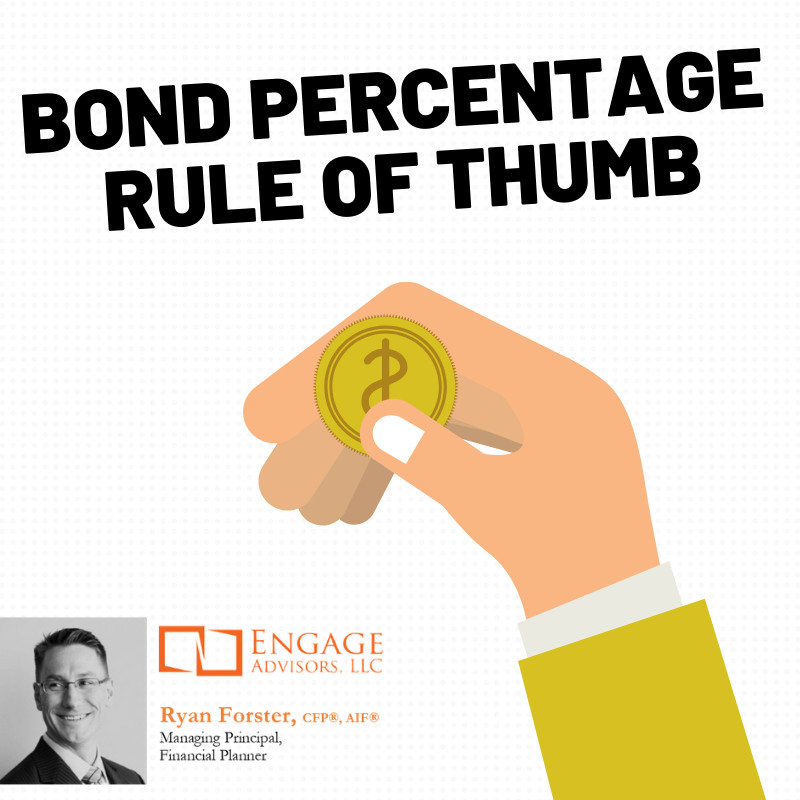“We are made wise not by the recollection of our past, but by the responsibility for our future.” – George Bernard Shaw
With great pleasure, it’s time to break down a financially dangerous rule of thumb. “Your age should represent the % of bonds in your portfolio.” Sound at all familiar? This rule, thankfully, is not as prevalent today as it once was. I believe this rule to be completely without merit, and rarely applicable – as often as it still comes up. The basic premise is that investors should expose themselves to less investment risk as they age. This is true in some cases, but not all.
Bonds are an important asset in a portfolio, they provide liquidity and stability. The return of a bond is typically based on the interest payment or coupon. But here’s the problem, for roughly 35 years, bonds have had an incredible run win a falling interest rate environment and that’s what most investors know and believe – that the value of bonds goes up and coupons are high. However, we now live in a rising interest rate environment where bond prices often fall and coupons are low. So why invest in bonds at all?
Hindsight is 20/20, but only if you look far enough. Thinking too recent is deceiving. We must look back decades to the last time we’ve seen flat or rising interest rate environments for prolonged periods. Although rising interest rates hurt bond prices in the short term, as issuers create higher interest-bearing bonds, the stable payments level out value in the long run. On the other hand, if interest rates stay flat, bond prices only change due to higher/lower default risk. In both environments, bonds are essential to make sure if investors need cash, they can. And when stocks plunge, they have the stomach to stay invested and not miss rallies.
What does the bond % rule actually mean? That if you’re 25, you should have 25% bonds in your portfolio. If you’re 50, you should have 50%. If you’re 90…You catch the drift. I could write up a dozen scenarios to disprove this rule of thumb. For simplicity-sake, let’s pretend you are 50 years old with a cool $1,000,000 with no other variables.
You’re planning on retiring in 17 years, at the age of 67. The rule states that you should have 50% of your portfolio in bonds. I disagree that half of your assets should be earning little or nothing for another 17 years… I think 20% bonds is much more prudent.
Let’s do some extremely simple math: Bonds return around 1-3% per year (Barclays Aggregate 5 year return is 2.5%). Stocks on the other hand should return somewhere around 7-10% (S&P 500 5 year return is 10.5%).
A 50% bond portfolio should return 4-6.5%. I believe this is overly conservative in most cases. Remember your $1,000,000? You have 17 years to go. I’d think you would invest moderately aggressive (About 80% stocks.) which should return between 5.8-8.6% over that time period.
What does that cost? Let’s use the average of each range, this rule would cost you roughly $875,000 in growth over 17 years.
- At 67 $1 million would grow to 2,386,578 at 5.25%
- At 67 $1 million would grow to $3,260,704 at 7.2%
Now you know the rule is broken, what do you do? First, know your time horizon – or how long you will be invested. Shorter means more bonds. Next, find your ability to stomach risk. Your tolerance is unique to you. Bonds in a portfolio can reduce risk, but they can also reduce long term reward. This takes a conversation and a deeper understanding of you as an investor. A couple thoughts on self-assessment:
Self-professed risky investor? In my experience, so-called risky investors, often panic when a major market decline occurs and are scared to death of further loss. Bonds can help slow down the roller coaster and keep you invested when you should be.
Consider yourself conservative? I often find investors who profess a conservative mentality, often don’t mind the ups and downs of the market no matter how bad the economy is. Less bonds can help you seize opportunities that, having a false sense of conservatism, would sneak right under your nose.
This is where professional help comes in. Do you want to learn more about bonds, risk, and long term investing? Please call Ryan Forster at 913.681.9155 or email ryan@engageadvisors.com.
Engage Advisors, LLC is a Registered Investment Adviser. This platform is solely for informational purposes. Advisory services are only offered to clients or prospective clients where Engage Advisors and its representatives are properly licensed or exempt from licensure. Past performance is no guarantee of future returns. Investing involves risk and possible loss of principal capital. No advice may be rendered by Engage Advisors, LLC unless a client service agreement is in place.

